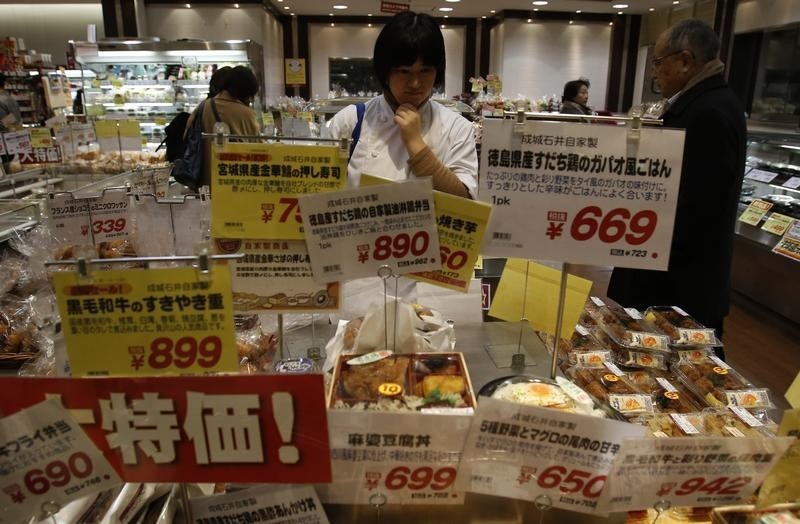By Leika Kihara
TOKYO (Reuters) - Japan's annual core consumer inflation ground to a halt in February, the first time it has stopped rising in nearly two years, keeping the central bank under pressure to expand monetary stimulus later this year.
Other data published on Friday didn't offer much solace with household spending slumping even as job markets improved, underscoring the challenges premier Shinzo Abe faces in steering the economy toward a solid recovery.
While the Bank of Japan has stressed it will look through the effect of slumping oil prices, the soft data will keep it under pressure to expand stimulus to jump-start inflation toward its 2 percent target.
Stripping out the effect of last year's sales tax hike, the core consumer price index was flat from a year ago, moving further away from the BOJ's price goal. The last time core CPI did not rise was in May 2013, when it was flat.
"Core consumer prices may fall as much as 0.5 percent, though they will hit bottom around July and rise toward the end of this year," said Junko Nishioka, chief economist at Sumitomo Mitsui Banking Corp.
"The BOJ already expects oil price falls to put downward pressure on consumer inflation, so today's data does not suggest it will ease monetary policy again any time soon," she said.
The headline core CPI, which includes oil but excludes volatile fresh food prices, rose 2.0 percent on-year in February, short of a median forecast for a 2.1 percent rise, government data showed.
The seventh straight month of slowdown came as little surprise to BOJ officials, who have acknowledged that falling fuel costs will keep inflation subdued for much of this year.
New BOJ board member Harada Yutaka, known as an advocate of aggressive easing, said on Thursday the two-year timeframe for inflation shouldn't be considered as rigid, signalling no appetite for immediate action.
But any persistent cooling in inflation will hamper the BOJ's battle to eradicate the deflationary mindset that crimped growth for decades. Most analysts expect the BOJ to top up last October's stimulus in the second half of this year.
JOBS, WAGES RISING
Household spending fell 2.9 percent year-on-year in February to mark the eleventh straight month of declines, separate data showed, as the hit from last year's tax hike lingered.
Policymakers expect the falling cost of gasoline and rising wages to boost household spending in coming months and support a tentative recovery.
In a sign of hope, many big companies plan to increase base salaries with the jobless rate having fallen to 3.5 percent in February, close to what analysts see as full employment.
Job availability stayed at a two-decades high in February, and the number of non-regular employees fell for the first time since comparable data became available in 2014 as more seekers found permanent jobs, data showed.

Japan's economy emerged from last year's mild recession as exports and factory output rebounded, although the recovery remains fragile given sluggish household spending.